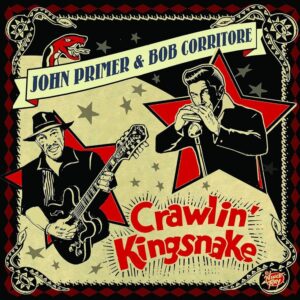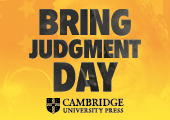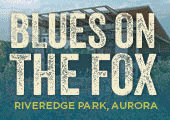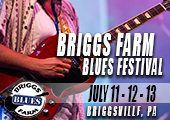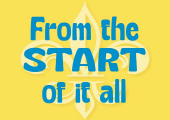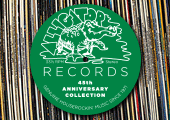JOHN PRIMER & BOB CORRITORE
Crawlin’ Kingsnake
SWMAF / VizzTone – SWMAF 27
Over the last decade, bluesmen John Primer and Bob Corritore have built up one of the finest duo discographies in contemporary blues. Their latest tandem release, Crawlin’ Kingsnake, adds another notch to the win column. Twelve tracks of crackling, meaty musical might, this is the kind of album that reminds listeners why they fell in love with the blues in the first place.
Primer is in magnificent voice here, one moment belting like an old-school blues shouter on the tons-of-fun Hiding Place, the next packing the weight of the doomstruck world into his delivery of Bow Down on Your Knees. His guitar work is every bit as electrifying. The Willie Dixon classic Down in the Bottom finds Primer mixing up a savory swamp sludge alongside guitarist Jimi “Primetime” Smith. Then, he brings shimmering, late-hour elegance to the mid-tempo B.B. King cooker Chains and Things.
Locked into a comfortable groove alongside Primer, Corritore leans into his harmonica with everything he’s got. He sears the air with pealing high notes and volcanic rips on Rosalee Blues (written by Primer’s old boss Muddy Waters), and This Little Voice finds his tone utterly filling the room. His clipped notes nip at Primer’s vocals like viper bites on the John Lee Hooker–penned title cut, and he brings an arresting blend of taste and strength to the Spanish-tinged You’re the One.
Primer and Corritore have assembled a crew of jackhammer-heavy hitters to accompany them on Crawlin’ Kingsnake. The aforementioned Smith provides peerless rhythmic support throughout the recording, interlacing with Primer’s ax in a formidable fortress of sound. Veteran bassist Bob Stroger forges the bedrock with unshakeable assurance, and he spreads a bit of soul over the undercurrent of Take a Message. Wes Starr’s drums are a critical component to the vibe, as the steady-rolling Waters tune Stuff You Gotta Watch makes clear. And Anthony Geraci cuts loose like the barrelhouse pianist from hell, his flourishes an ideal seasoning for Gravel Road’s ramblin’-man stew.
Crawlin’ Kingsnake closes with the album’s third Waters composition, the aptly titled Feel Like Going Home. Indeed, it’s like a trip back to that storied Land Where the Blues Began: relentless rhythm, virtuosic solos, just enough tenderness to ease the lyrics’ pain. If this were a concert, right about here is where the crowd would break out the lighters. Primer and Corritore fully warrant this ecstatic salute. Long may they burn.
—Matt R. Lohr
 EDDIE COTTON
EDDIE COTTON
The Mirror
Malaco – MCD7562
Mississippi guitarist and singer Eddie Cotton moves through a score of musical landscapes—soul, gospel, blues, jazz—on his spacious new album, The Mirror.
The Mirror kicks off with the sizzling Woman Satisfied, a strutting blues fueled by jaunty electric piano runs and Cotton’s own piercing guitar notes. Crunchy riffs lead into the Memphis soul stew of Your Specialty, while the slow-burning title track features Cotton’s warm, intimate crystalline guitar stylings backing his haunting vocals. Flowing orchestral piano notes and chords open the swaying 12-bar blues No Crime No Time; the song unfolds languorously, building to an instrumental bridge that floats on Cotton’s crisp, stinging lead runs. On the shimmering soul jazz of I Want You, Cotton delivers smooth vocals that channel the high range sexual squealing of Al Green, while the southern soul of Leaning Towards Leaving rides along bright, gospel-inflected layers of piano and vivid lead lines floating under Cotton’s yearning vocals. Double Down on a Nine blends a fervent jump blues thematic line with some straight-ahead roadhouse rocking, propelled by keys, bass, and guitar. Gimme What I Paid For slides and glides along a funked-up groove, while the tender Sweet Science of Love rides along a warm, soulful vibe with a sonic architecture that combines the sounds of Bobby “Blue” Bland, Wilson Pickett, and Clarence Carter.
The Mirror showcases Eddie Cotton’s generous and intimate guitar work, his joyous and warm vocals, and his organic approach to songwriting.
—Henry L. Carrigan Jr.
 ALEX HARRIS
ALEX HARRIS
Back to Us
Shanachie Entertainment – SH 5858
Vocalist Alex Harris moves to head of the class for retro-soul music with Back to Us. Harris is a powerful, emotive singer who has a handle on the style and sound of 1960s soul music. The 11 tracks on this album—nine originals and two covers—could easily be slipped on a Stax Records compilation, and most listeners wouldn’t be able to tell that they were recorded over 50 years after the demise of the original Soulsville, USA.
The opening track, Millionaire, sets the tone as a gospel-influenced piano is joined by the purr of a B3 organ and a strummed acoustic guitar to provide a cushion for Harris, whose slow-burn vocal calls Percy Sledge to mind. The song slowly builds in intensity and when the background vocals and horns kick in on the chorus, Harris really cuts loose. On Something Gotta Change, drummer Dez Davis delivers a patented Al Jackson backbeat and JoJo Streater’s horn playing and arrangement channel the Memphis Horns, driving the singer on an up-tempo rocker. Harris shows off his range with some Aaron Neville–style upper register singing on Falling for You. He shows he can get down with the blues as he injects some Bobby “Blue” Bland grit into Don’t Hide. The Monophonics join Harris on a Stax-style rave-up Lose My Religion. Harris gets to spar vocally with Chantel Hampton on the title track and Ruby Amanfu (along with husband Sam Ashworth of acoustic guitar) on Way Up.
The two cover tunes make it clear that Harris is making a bid for recognition in the tradition of great soul singers. It takes a lot of self-confidence to tackle tunes by Otis Redding and Solomon Burke, and Harris is more than up to the task with the former’s I’ve Got Dreams to Remember and the latter’s Cry to Me. Back to Us is essential for fans of 1960s southern soul music, and it looks like Alex Harris has found fertile ground for his creativity to expand that tradition.
—Robert H. Cataliotti
 LEYLA MCCALLA
LEYLA MCCALLA
Sun Without the Heat
Anti- Records – 88034
It’s hard to imagine that it’s been ten years since the 2014 release of Leyla McCalla’s debut album, Vari-Colored Songs: A Tribute to Langston Hughes. Her metamorphosis from a classically trained cellist to a singer-songwriter, guitarist, banjo player, and bandleader has been quite remarkable to observe, and the release of her sixth album, Sun Without the Heat, testifies to her dedication to artistic growth and expanding her sonic and stylistic palette. One aspect of her artistry that remains constant as she explores musical approaches and traditions with each new release is the voice. It’s quite special, possessing both a jaunty, life-affirming lilt and a tender vulnerability that at times evokes the great Billie Holiday.
McCalla has indicated that the material for Sun Without the Heat was inspired by Black feminist writers like Alexis Pauline Gumbs, Octavia Butler, and adrienne maree brown; concepts of Afro-futurism; the oratory of Frederick Douglass; and pan-diasporic rhythms from Haitian twoubadou, Brazilian tropicalisimo, Afrobeat, Ethiopian folk music, and the New Orleans second-line rhythms of her adopted hometown. That’s quite the heady mix, and McCalla says that much of the framework for the music was developed in the studio with her band, guitarist Nahum Zdybel, bassist Pete Olynciw, drummer Shawn Myers, and producer and synthesizer/organ player Maryam Qudus. The performances do exhibit an exploratory, live-in-the-studio looseness.
The lyrics are often simple and repetitive, but they are clearly shaped by the concepts McCalla brought to the studio. Scaled to Survive rides on a twoubadou groove and addresses the connections between individuals and parents. The band really locks into a booming second-line funk groove on Tower. Two of the tracks—Love We Had and Take Me Away—are infused with the galloping Ethiopian rhythms. Tree starts off as a gentle fable of a woman overlooking the sea who doubts she can be loved and turns herself into a tree, but a little over two and a half minutes in, it morphs into a jagged-edged, distorted swirl that is quite jarring. Whatever the intention might be, it does provide a marked contrast to the subsequent lovely, simply strummed acoustic guitar title track, which is largely constructed from lines from one of Douglass’ abolitionist speeches. Two other acoustic numbers are also standouts, the encouraging Give Yourself a Break, which features a dancing countermelody from Olynciw’s bass, and I Want to Believe, a closing benediction duet that features Olynciw on piano and McCalla on cello.
—Robert H. Cataliotti
 DASHAWN HICKMAN
DASHAWN HICKMAN
Drums, Roots & Steel
Little Village Foundation – LVF 1049
DaShawn Hickman is a new name on the scene, bringing some fresh interpretations of some classic gospel songs out of his Keith Dominion House of God church in Mount Airy, North Carolina. His debut album, Drums, Roots & Steel, will certainly turn heads in his direction, as his vibrato-laden lap steel guitar playing brings the gospel church style to the forefront. The instrumentation is fairly stripped down, creating a pleasant, uncluttered sonic landscape of slide guitar and bass (performed by Charlie Hunter) that sits comfortably on a warm bed of traditional African drums and other assorted percussion, led by Atiba Rorie and Brevan Hampden.
The disc opens with the traditional New Orleans piece, merely called Saints, a hip, stripped-down version of When the Saints Go Marching In. Here, it’s set in a minor key as opposed to the joyous major key listeners are so accustomed to hearing. Heavy syncopated percussion creates a rhythmic wave in the background as Rorie and Hampden accompany the silk steel barrage.
Just a Closer Walk With Thee is a languid, minor blues melody with an elongated intro. Hickman presents a laid-back groove that merely states the melody and immediately gives way to the one-chord vamp that then allows him to stretch out. Hidden inside the groove is a slickly inserted direct quote of Wade in the Water. This piece prominently features the percussion ensemble of cabasa, congas, tambourine, and cowbell.
Shout is an appropriate title for the next groove—a hand-clapping tune that features the vocal prowess of DaShawn’s wife, Wendy Hickman, chanting, “Lord, I just wanna thank you” over a traditional, medium-tempo blues chord progression. Things slow down with the pensive piece Don’t Let the Devil Ride, with DaShawn’s male vocal presence delivered upfront—only to switch later to a different rhythmic groove with more galloping pace as Wendy’s vocals take the wheel, serving a much more sensual style.
Morning Train has a bit of a funk groove (reminiscent of Sly Stone’s Thank You for Talkin’ to Me, Africa from the 1971 album There’s a Riot Goin’ On), with Wendy singing “the evening train might be too late,” before DaShawn states the melody clear and plain, then tosses it back over to the percussionist and bassist Charlie Hunter. He holds off on the single-note lap steel guitar discourse until later in the tune, when he uses the wah-wah pedal to great effect combined with his wicked vibrato—it’s definitely the best solo on the album.
The timeless staple Precious Lord makes an appearance with a mid-tempo 3/4 time feel, as Hickman takes his time to articulate the melody. The album closes with a brief version of Wade in the Water (merely hinted at in the earlier Walk with Thee solo). This time, however, the bass is eschewed for a direct duo between steel guitar and percussion. The conga solo stretches out and takes the lead for the final declaration.
Though this album doesn’t purport to be either your typical blues or gospel album, it deceptively holds not only the elements of groove-oriented blues and gospel, but also the added ingredients of soul, R&B, and funk. Recorded at Earthtones Studio in Greensboro, North Carolina, these seven carefully selected pieces land on familiar territory, yet offer fresh interpretations for the uninitiated.
For DaShawn, there will be obvious comparisons to other slide guitarists (think either traditional sacred steel Robert Randolph of the Randolph Family Band, or the prolific guitarist Derek Trucks whose perfected slide style is undeniably based on the sacred steel tradition). Still, Hickman seems up to the challenge of carving out a path of his own. Produced by none other than the prolific eight-string guitar wizard Charlie Hunter, DaShawn’s debut album is sure to warrant a follow-up album with even greater rewards in store. Indeed, the native drums lead the steady march as the steel strings drone over the melodies and chords that represent the very essence of the roots found in the gospel tradition.
—Wayne Goins
 SUE FOLEY
SUE FOLEY
One Guitar Woman: A Tribute to the Female Pioneers of Guitar
Stony Plain Records – SPCD1486
Before Spanish comedian and actress Charo shot to fame on the strength of her over-the-top appearances on 1960s and ’70s TV shows like Laugh-In and The Tonight Show Starring Johnny Carson while enthusiastically repeating her suggestive catchphrase “cuchi cuchi” in her heavy Spanish accent, she was recognized as an expertly skilled flamenco guitarist.
She was also the first woman that a young Sue Foley ever saw play the guitar. In the process, she laid the foundation for a career that has earned the Canadian-born Foley awards and accolades as one of today’s most accomplished and fiery electric blues artists. Charo’s underrated guitar abilities served as an impetus for Foley to begin the 30-year journey to honor female guitar greats that spawned the release of the exceptional One Guitar Woman: A Tribute to the Female Pioneers of Guitar.
In addition to Charo, Foley honors eight pioneering female guitarists accompanied only by the flamenco Blanca nylon-string acoustic guitar made by acclaimed Mexican luthier Salvador Castillo that she purchased in 2022. Working with producer Mike Flanigin, Foley carefully selected 11 songs that resonated personally with her—many touching on themes of loss, regret, and life on the road—by guitarists whose contributions to the instrument have been forgotten or overlooked.
One Guitar Woman is an extension of a quest to learn about and honor female guitarists that dates back to 1991 with Foley’s launch of the ongoing “Guitar Woman” music history research project. In fact, Foley will soon complete work for a PhD in music arts.
But Foley doesn’t just cover these songs; she faithfully plays them using the styles and techniques employed by the originators, while inhabiting them with her own clear and powerful voice.
On Elizabeth Cotten’s Oh Babe It Ain’t No Lie and Freight Train, Foley digs into the intricate phrasing and chordal placements of Cotten’s Piedmont fingerpicking style. The acoustic approach on Chicago electric blues pioneer Memphis Minne’s In My Girlish Days and Nothing in Rambling gives the songs a melancholy poignance.
Foley explores the country blues style and flatpicking prowess of Maybelle Carter, the matriarch of the legendary Carter Family, on Lonesome Homesick Blues and tackles the deceptively complex “Carter Scratch” technique on the Foley original Maybelle’s Guitar, a tribute to Carter’s famous 1928 Gibson L-5 guitar.
The gospel song My Journey to the Sky captures the power and grace of Sister Rosetta Tharpe, known as the “Godmother of Rock ’n’ Roll.” Motherless Child Blues and Last Kind Words Blues mines the soulful blues of the mysterious 1920s-era duo of Elvie Thomas and Geeshie Wiley. Foley sings verses in Spanish and English on revered Tejano guitarist Lydia Mendoza’s mournful Mal Hombre.
French classical guitar prodigy Ida Presti’s uncanny dexterity, warmth, and emotional depth shines on the instrumental Romance in A Minor. Foley closes the album with Charo’s blazing classical/flamenco instrumental La Maleguena.
No dusty historical artifact, One Guitar Woman is a lush, brilliantly performed salute to women who helped forge the history of the guitar.
—Rod Evans
 JAMES HARMAN
JAMES HARMAN
Didn’t We Have Some Fun Sometime
Electro-Fi Records – 3465
James Harman’s posthumously released CD Didn’t We Have Some Fun Sometime is another reminder of what a great artist we lost a couple years back. Andrew Galloway of Electro-Fi Records put this release out in conjunction with Nathan James (who both produced and played brilliantly on the CD) and it deserves boatloads of praise. Harman is just tops in his writing and performances here, followed exquisitely by his longtime band of guitarist Nathan James, drummer Marty Dodson, upright bassist Troy Sandow, and percussionist Mike Tempo. Both Carl Sonny Leyland and Gene Taylor make appearances on keys this as well. They catch everything he throws at them and the results are hilarious and thrilling.
James Harman’s singing and blues harmonica style were very much products of his Alabama upbringing in both the 1950s Memphis Sun blues sound and his rural blues roots. The record bounces back and forth between acoustic duos and trios with James and bassist Sandow, and electric quartet tracks with a rough-and-ready old-style drive. James steals the show on a lot of these as one of the best blues players of his generation on both acoustic country blues and string-bending electric blues—covering the gamut from Robert Johnson to T-Bone Walker styles.
The 12 songs on this disc are a combination of a couple pandemic livestreams for eight selections and four studio recordings from Nathan James’ Sacred Cat Studios. The pandemic looms large on a couple songs here, mainly on A Hand Shake, which describes the solitary handwashing, lack of interaction, and paranoia of the pandemic in real time. On Who’s Got the Geetus James laments “opportunity knocked but I was out” and “I’m outstanding in my field while standing in my yard.” Only Harman could come up titles like A Rut and a Groove while describing both graves, holes, and musical beats. Mind’s Eye Makes the Call has the great line about whether you actually saw Superman in a phone booth with a super badass shuffle by band and wicked Lonnie Johnson / Robert Lockwood Jr.–styled guitar by James.
Taking It on the Lam has the great line about how he feels so unnecessary, which, coming from Harman, expresses extreme vulnerability. It makes it a heartbreaking song from an artist of his caliber who was shunned by the powers that be in the last 20 years of his creative life, when he was still such a vital force musically.
The final selection, the title track, is a perfect goodbye for the album—a ballad with Harman’s longtime cohort Gene Taylor, who died two months before Harman in Austin in 2021. Didn’t We Have Some Fun Sometime is a sort of reminisce of James’ life that recalls good times and bad as part of life’s deal for us all. Every song here is a winner.
—Mark Hummel
 ERIC BIBB
ERIC BIBB
Live at the Scala Theatre
Stony Plain – SPCD 1487
With a career that spans over 40 albums and three Grammy nominations, Eric Bibb has earned a reputation as one of the blues’ great storytellers and philosophers. His warm, intimate vocals and incisive songwriting are accompanied by a deft touch on guitar. Raised in a family that was immersed in both the Civil Rights Movement and the Greenwich Village folk music scene, Bibb quickly developed a love of music and a keen awareness of history and social issues. Live at the Scala Theatre, recorded in Stockholm in 2022, showcases his ability to mesmerize an audience with his passion and musicianship.
Bibb’s honey-smooth voice and delicate fingerpicking take center stage on a reading of the traditional Goin’ Down the Road Feelin’ Bad. Greger Andersson’s harp and Johan Lindström’s pedal steel guitar provide beautiful accompaniment. A three-piece string section arranged by Erik Arvinder and David Davidson adds depth. The gentle, melodic Along the Way gives listeners a glimpse at Bibb’s philosophical side. As he sings, “Take the time to bless the ones who’ve done you wrong / what won’t kill you makes you strong,” Lindstrom’s pedal steel serves as a perfect musical foil. A lowdown take on Walter Vinson’s Things Is ’Bout Comin’ My Way demonstrates Bibb’s skill with traditional blues. Ollie Linder’s acoustic bass anchors the arrangement, and pedal steel and strings combine to create a unique blues sound.
Rosewood is one of the album’s most memorable tracks. The song is a harrowing account of the 1923 massacre of the African American community of Rosewood, Florida. Bibb believes that telling the tale in song “encourages us to face and learn from our past.” As Bibb performs the heart-wrenching vocals, the string section is in top form. Whole World’s Got the Blues is another tune that doesn’t shy away from social commentary. Andersson’s chromatic harmonica riffs and electric guitar work from Lindstrom perfectly complement the anguish in Bibb’s voice. The joyful Mole in the Ground is a perfect closing track. Bibb gives each band member generous solo space, and the track culminates in a spirited sing-along.
Live at the Scala Theatre allows listeners to feel as if they were in the audience when this set was recorded. That’s the highest praise a reviewer can give to a live album.
—Jon Kleinman
 RICK ESTRIN AND THE NIGHTCATS
RICK ESTRIN AND THE NIGHTCATS
THE HITS KEEP COMING
Alligator Records – ALCD 5019
Bay City native Rick Estrin and his longtime backing band, the Nightcats (consisting of multi-instrumentalist / musical director / producer Christoffer “Kid” Andersen, keyboardist/bassist Lorenzo Farrell, and drummer Derrick “D’Mar” Martin), excel at a sound that remains true to the blues but retains a certain self-effacing style that effectively tempers an otherwise tempestuous approach.
Estrin has ample experience in that area. His performing career stretches back to the 1970s and now, with his band’s sixth album for Alligator under their collective belt, he and his collaborators continue to create a cohesive sound that’s taut, tight, but still loose enough around the edges to allow for extra sizzle and spontaneity. Estrin’s influences are never far from the surface—be it the early inspiration provided by Ray Charles, Jimmy Reed, Champion Jack Dupree, Mose Allison, and Nina Simone, or his later infatuation with Lowell Fulson, Sonny Boy Williamson II, Little Walter, Percy Mayfield, and Detroit bluesman Baby Boy Warren. He plays harp in the finest blues tradition, whether varying tone and timbre to fit the mood or simply laying down a riff that finds him in sync with Andersen while gravitating towards their groove.
That said, the tempos vary, from the decided drive that defines Somewhere Else and The Circus Is Still in Town (The Monkey Song), to the shuffled pacing of Diamonds at Your Feet, Sack O’ Kools, and 911, the slow saunter of Everybody Knows, and the sprawling, soulful sound of the title track.
Estrin’s indeed a man of many talents, whether as a bandleader, a soloist at the fore, or an expressive soulful singer. He manages to turn the turgid blues of I Finally Hit the Bottom and the slow, seductive strains of Whatever Happened to Dobie Strange? into nothing less than a tour-de-force, each fully engaged with emotive intent. The result is a series of songs that vary in delivery but remain cohesive in terms of drive and determination.
In that regard, The Hits Keep Coming not only stays true to its title, but also offers reason to believe those hits can continue well into the foreseeable future.
—Lee Zimmerman
 STEVE HOWELL & THE MIGHTY MEN
STEVE HOWELL & THE MIGHTY MEN
99 ½ Won’t Do
Out of the Past Music – 00TP 0019
Every release by Texas guitarist/singer Steve Howell feels like the welcome return of an old friend thanks to his uncanny ability to make both hits and obscure gems from bygone eras feel as fresh as a new set of strings.
A big part of Howell’s success stems from the careful thought he puts into selecting the songs that he and his backing band, the Mighty Men—Chris Michaels (electric guitar), Jason Weinheimer (bass and keys), and Dave Hoffpauir (drums)—work their stripped-down magic on. Like a music history professor who doubles as a guitarist with unmatched taste and impeccable tone to go along with a soothing and reliable baritone, he digs deep to learn the history and backstory of the songs and artists before he sets foot in the studio.
On 99 ½ Won’t Do, Howell and company deliver precise, yet relaxed renditions of ten tunes previously recorded by a varied group of artists that includes Betty James, Sister Rosetta Tharpe, Charley Patton, Little Willie John, and Charlie Rich. This time out, though, they turn up the amps a bit and dial in tasty guitar reverb and atmospheric flourishes that bring the songs fully into the 21st century.
Song sequencing is another part of Howell’s secret sauce, and kicking things off with James’ I’m a Little Mixed Up is a brilliant choice. The swinging vibe, warm organ and shimmering guitars is a perfect table setter for what’s to come. The title track, a gospel song famously recorded by Tharpe in 1949, gets a smoky, bluesy touch augmented by tasteful electric guitar that embraces the measured, distorted, countryish tone that Dire Straits’ Mark Knopfler perfected in the ’80s.
The instantly recognizable melody and unmistakable chord dynamics of Scott McKenzie’s 1967 counterculture hit San Francisco (Be Sure to Wear Flowers in Your Hair) combine for a peaceful, soothing, almost reverential, instrumental take. Another instrumental, Don’t Let Me Be Misunderstood, originally recorded by Nina Simone in 1964 and made famous by the Animals in 1965, features marvelous interplay between electric and acoustic guitars.
Little Willie John’s Talk to Me, Talk to Me, retains much of its mid-1950s slow-dance jukebox feel. Howell’s defiant, testifying vocals on God’s Gonna Cut You Down gives the gospel traditional the heft it deserves, as he sings, “Tell the gambler, rambler, back biter / Tell ’em God almighty’s gonna cut ’em down.”
The band’s gritty cover of Charley Patton’s Stone Pony Blues simmers with an internal heat cooked up by ghostly guitars and an urgent groove. The languid approach on the instrumental Apache gives way to a surf rock flavor that’s both unexpected and inventive.
While Howell remains committed to offering traditional acoustic blues and standards in an extremely sincere and authentic manner, 99 ½ shows he and the Mighty Men aren’t averse to mixing in unconventional covers and serving every song with modern accents and arrangements.
—Rod Evans

